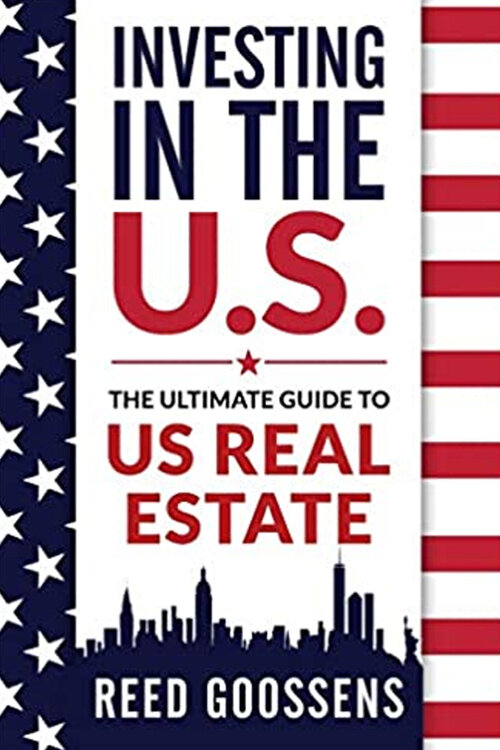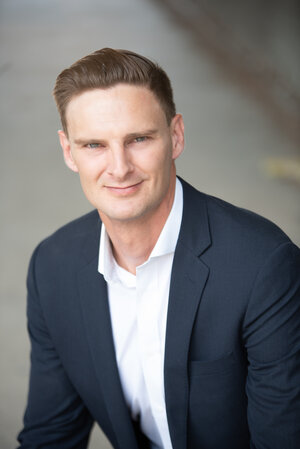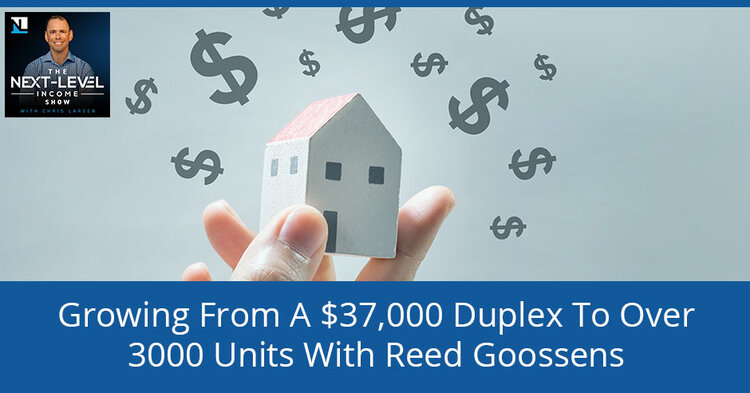Subscribe to The Next-Level Income Show
Are you hesitating on going all-in with real estate? Meet Reed Goossens, who went from owning a $37,000 duplex to having over 3000 units. His advice? You don’t get to deal number ten without getting deal number one. Overcome analysis paralysis and learn from experience! Join in the conversation as Reed shares more of his story with Chris Larsen. Plus, you’ll get more nuggets of wisdom that can elevate your cash flow. Tune in and start investing!
—
Watch The Episode Here:
Listen To The Podcast Here:
Growing From A $37,000 Duplex To Over 3000 Units With Reed Goossens
On our show, we have Reed Goossens. You don’t want to miss this. He’s going to tell his story about coming all the way from Australia, having $40,000 cash traveling on a Greyhound bus to source his first deal, and now how he manages over 3,000 units in the multifamily space. He’ll also tell you how to get copies of the two books that he’s written!
In 2012, Reed quit his job in Australia and moved halfway across the globe to the US to change his life and to chase a dream. With limited funds, no investing experience, and no credit, Reed went from purchasing a small duplex to growing his own real estate investment firm, Wildhorn Capital. Reed now syndicates large multi-family dollar deals across the US. He has also achieved financial freedom and has taken control of his life. He’s also a podcast host and a bestselling author of two books, one with one of my partners, Bryce Robertson, called 10,000 Miles to the American Dream.
-—
Reed, welcome to the show.
Chris, thanks for having me.
We were talking and we were catching up. We met for the first time a few years ago and I can’t believe it’s flown by here in Asheville, North Carolina. I know all about your story. I read your book. I even partnered with one of your co-authors on one of your books. For those who haven’t got to know you as I have, please share a little bit more about your history, where you’re living now, and what were you into.
I am originally from Australia as the story goes. I moved here in 2012. I love New York City. I loved a girl who now is my wife. It all worked out. I was bitten by the real estate bug prior to moving to the United States. I moved here to be an expat to live in New York City for a couple of years and I was going to move home. I quickly realized when I moved here that the barriers to entry are a lot lower. There are a lot more cashflowing opportunities here in the United States compared to where I was from in Australia. I took that with two hands and ran with it.
I bought a property with $38,000 in all cash when I first moved to the US. I had no credit. I didn’t understand what credit was. Now I live in Los Angeles and have been living in Los Angeles for many years now. I’m a Cofounder of Wildhorn Capital. I am also a Cofounder of the RSN Property Group. We control about $450 million assets under management. I’m a lead sponsor. I do everything on the operation from acquisitions to depositions, building our systems, contracting and asset management in general. All that stuff falls on my shoulders.
I will say my background is in Structural Engineering. I have come from the institutional world of building stuff. I read Rich Dad, Poor Dad as most of your audience back in 2009. I’ve been on this journey ever since. Years ago, I wouldn’t have thought back when I moved here that I’d be sitting here talking to you about syndication. It’s been an awesome ride and I can’t wait for the next ten years.
There’s so much I love about your story. I’d love to dive into it. We both have engineering backgrounds. You’re more so than me because you’re out there doing it. You came to America and you didn’t start doing multifamily deals. I’ve seen those first deals you did and I was like, “Those look nasty.” Maybe tell the audience a little bit more about that first or second deal to give a little inspiration that you can go from doing those things as we did, and then move up the chain.
The big thing for me was in 2009 or 2010, I was self-educating in Australia about everything I could about Australian real estate. I’d saved up a bit of money. I was going to do some maybe flip, but then I moved to the United States. I spent a bit of money moving halfway across the world as you do. What I found was when I moved to the US and how you guys are, the access to information here blew my mind.
The real estate investment clubs that I met you at, I remember being two weeks fresh off the boat and my first REIA event was in New York City. There were 200 people. We were lucky to get twenty people from the local investment club in Australia. Coming here and seeing that across every MSA across the country, I was like, “This is powerful information.” I knew that if I kept hanging around the right people, I would eventually do a deal.
In 2012, I’ve already been self-educating for about two and a half years at that point. I built my own models. I built my own cashflowing models. I understood the financing behind it and the numbers of doing smaller deals, but I hadn’t done a deal yet. I was getting to the end of that ceiling of analysis paralysis. I said to myself, “Where are you going to go? You need to get a deal done because you’re not going to learn it by reading a book for the next ten years. You need to go into bloody action.” I chose a market that I could afford.

Over 3000 Units: Syndication is a team sport, and you need someone else who can complement your skillset.
Being fresh off the boat in 2012, no one was going to give me a loan. I had to pay all cash and all the cash I had was about $40,000. It’s a lot of money but I was willing to risk that and say, “If I’m going to go do my own deal, I don’t want to get a mentor. I don’t want to do that at this point. I want to do a deal myself because my nose has been stuck in a book reading all about it. I got to go out to the deep end and learn from experience.” That’s what I did.
I picked a market that I could get to. On a Greyhound bus, I remembered leaving Penn Station on a Saturday morning. It took me four hours to get up to Syracuse, New York. I had a couple of hours on the ground with the broker. He was driving around in his little car. He dropped me at 3:00. I’d get back on the bus, go back to New York City, and I’ll be back in time to have a few drinks with the boys. That’s what got me started. That led to deal number 2 and 3. You don’t get to deal number 10 without doing deal number 1. Many people stopped because they’re worried about what’s going to happen. For me, it was my money. It would be a pain in the ass if I lost it, but it wouldn’t be the end of the world. It’d be a bloody good lesson in life about how to get started, dealing with contractors, dealing with property management companies, dealing with tenants.
I had a drive-by shooting at that first deal. It was a Section 8 housing deal. It is going right for six months. Being a fresh-faced, bushy-eyed Australian, I had no idea about Section 8 housing, but I learned it. I didn’t lose my shirt. It made some money and it was the best experience I could have done because it was my experience. That’s the most important thing because I proved to myself that I could go out and that pushes my boundary. Ultimately, that leads to your next deal like, “What’s next?” It was all about the power of that first deal. It’s incredible. I implore people who are out there to do the first deal that you can afford so you can get out of the starting blocks.
To recap that. You come here from a different country. You can’t get a loan and has to pay all cash. You went to Syracuse, New York, four hours away from where you were living and made it happen. Also, the shooting which I’ve dealt with some dirty stuff like that in the past, the Section 8, and you still pulls it off. That’s phenomenal. Let’s skip ahead. What’s the biggest deal you’ve done here in recent history?
We closed on a two-pack deal of $75 million. Our assets under management now are at $450 million. We have about 3,000 doors. I’m the Cofounder of Wildhorn Capital and RSN Property Group. Both came out of two guys wanting to build a syndication company and pushed the boundaries as we keep ongoing. It’s been a hell of a ride. I can tell you that.
What I love is all the things that you described like fly-in or drive-in to another market, touring with a broker, looking at deals, going through stuff, and analyzing those deals, you’re still doing that same stuff, only on a bigger scale.
Yes. I live in LA. I’ve got to get on planes all the time to fly to different markets like Texas. I’m there once a month. To get calm with the market, you’ve got to spend a bit of money. You got to get in a car. You got to take action. I got on a Greyhound bus back in the day. That Greyhound bus now looks like it’s a plane. I can do this from the moon if I needed to. It is only about taking the right action to go off and know a market. The way I know marketer is I underwrite deals and I underwrite a ton of them. I’m talking 50 deals in a market before I get a standard market. It’s not sexy but you got to do that hard work and I still do that now.
If I’m going to go look at a new market, the number one piece of advice is, “Let’s get all the broker lists and underwrite every single deal that comes to market.” It doesn’t matter if I’m going to bid on it or not. It’s more the data. What’s it selling for? What’s the cost per door? What are the expenses they’ve got on it? What are they charging for insurance in this market? What are they charging for taxes? All these little bits of information can be processed. This is the good side of the tracks. This is the wrong side of the tracks. It’s so important to have that desktop study. The beauty of it is you can do it from your home, in New York, the moon or Australia.
You mentioned your partner. Let’s talk about how you met your partner and how you guys split up relationships and responsibilities. I want to talk about what markets you guys are looking at now.
Partnerships are super important. Partnerships will change. I’ve had bad partnerships in the past before I got into syndications. Partnerships will evolve in the next 10, 15 years. The big thing is when you’re starting a business in real estate, particularly in syndication, it’s a team sport. There are many hats to wear and you need someone else who can complement your skillset. My business partner now is a complementary skillset to me. He was boots on the ground. I didn’t have that. I was looking at Dallas, small 50, 60-unit deals because I’d done some co-syndications and deals with my mentor back in the day there.
I knew the market fairly well. What I didn’t have was a broker relationship. That’s why when you’re getting started, you got to bring on partners because you can’t afford to pay an employee. Partners are going to work as hard as you are. It’s about the synergy of skillsets. You want to find a partner who can be a complement to you. You don’t want to find a partner who’s doing exactly the same bloody thing. Otherwise, the other half of the coin needs to be filled as well.
It was important finding that partner. The advice that I’d give to anyone looking for a partner is to understand what your skillsets are. What can you bring to the table? What’s your superpower? What are you missing? That’s where you’re going to fall short. It’s how you plug those holes of the skillsets you’re missing that’s going to make or break your success. Partnerships will change over time. They evolve and that’s completely fine. It’s the nature of business, but as you’re starting out, partnerships can be very powerful with the right partner. I didn’t meet Andrew one day and I’m like, “We’re going to be partners tomorrow.” It took a time of courting like going out on a date. You got to court the person before you get into bed with them.

Investing in the US: The Ultimate Guide to US Real Estate
There are social media these days and these apps. I didn’t have those. Maybe you did. I wholeheartedly agree. Even my wife is different and it’s great. We run more than one business together now and we have different skillsets. We work with a coach to help analyze our personalities and StrengthsFinder, then divide responsibilities and figure out how to communicate. What are some of the tools that you and Andrew have used to figure out how to do those things and divide the responsibilities and who focuses on what?
In the beginning, it was pulling from your personal background. I came from an engineering background. I had been working for a big developer here in Los Angeles for a few years. I brought more of the systems mindset, where Andrew bought more of the relationships with the brokers to the table. You need both. You can’t have one without the other. You’re getting started because you need to prove to the brokers that they can award you the deal. Their reputation is on the line as well.
Having that person interfacing is important and having someone like myself who’s building the list, building systems, doing all the backend stuff, making sure that I’ve worn every hat, everything from CEO to capital raiser to legal reviewer, all the way through hiring and firing. I do everything and so does Andrew, but you need to experience those different hats to understand where your skills are. How are you going to grow in the future? That’s also another thing. I don’t plan to be in operations forever. Where would I find myself eventually? If you’re starting out, it’s important to go back to the skillset. Do you have someone that can fill those voids for you if you aren’t missing them in your own repertoire?
As somebody that’s now scaled to the point where you have a team, what’s some advice that you have for people that are going through this process? What you said is perfect. If you’re an entrepreneur or a business owner, if you understand every aspect of the business, it makes you better as a leader. What advice do you have for people that are looking to scale that are coming and building a team and they’re entrepreneurs themselves?
In the beginning, it’s all about being lean. It’s about doing those extra hours. I couldn’t leave my day job until I had my green cup. I’d already done four deals before I got to the point where I could leave. I probably could have left earlier but I wanted to have some security.
When was that?
In 2019. It wasn’t that long ago but I’ve done four deals on my own at that point when I left. I can talk about the story about joining the developer because that was critical in my growth. Back to what you’re saying, it’s about being lean in the beginning. You don’t have a lot of money. The reason you bring on partners is because you can’t afford to pay an employee and you need that other person to help. Having experience in every single facet of the business is super important. Also to know what you’re good at and what you want to outsource. Over time, we do an exercise. I created an exercise. It’s quite beneficial. It’s like an XY graph and I can get into it. What I enjoy is the X and what moves the needle from the business point of view.
There are all these different segments. I talk about black time, blue time, red time and green time. You need to do it once a year. You’re dividing out the things that you do and don’t like about the business, stuff that gives you full enjoyment. What moves the needle is going to be in the black time. Blue time moves the needle but you hate it. Red time, you hate doing it. It doesn’t move your needle, but it needs to be done like accounting and stuff like that. There’s the green time which is not going to necessarily move the business needle, but it moves the enjoyment factor like working out or spending time with family. Analyzing that as I’ve gone on in my career and as I continue to go on helps make me sharper in who I want to hire, but also the skillsets that I want to know that I can find myself from. Maybe I’m not the best person to be doing this.
An example is since we started, I’ve been wearing a hat of a CFO. I’m not a CPA but I understand budgets and balance sheets and all that stuff. I remember getting chewed at one time by an investor because something happened with our books. I didn’t catch and record it. It was an example of like, “We need to be better in this department.” We had a CPA and a bookkeeper but they’re all third-party. We need someone in-house or sharing part-time with someone else. That could be the person the investor goes to rather than the founder and leader because I’m not going to have a skillset in CPA like someone else who’s gone through school to do it. I was dangerous enough to be like, “It’s wrong and that needs to be changed.”
It’s a little bit of a ramble but it’s more to do with being self-aware, first and foremost, but also knowing that you need to roll up the sleeves, get it and figure it out. That’s probably the first thing. Knowing when to get scale, to learn to fire yourself and to know where your best ability is. What’s your highest and best use? It may not be certain tasks, but you may do those tasks to get to a point where you have the time, space and headspace to go, “What do I need to outsource?”
I love that tool because I read a book called Idea to Execution. The whole slogan is, “Optimize, automate and outsource.” Everything you’re describing is figuring it out, figuring out how to optimize and how to make it work. Can you systematize it? I use the word systems. That’s what I used in my book. It’s what I teach my coaching clients. Can you outsource it? If you’re worth $1,000 an hour and you can pay somebody even $100 an hour, that’s a tenfold return on your money. That’s fantastic advice when it comes to that. I’ve read the book that you wrote with one of my partners here, Bryce Robertson, 10,000 Miles to The American Dream. I can honestly say I’ve not read Investing In The US yet, but tell the audience a little bit more about why you wrote the books. What’s inside of them? What to expect if they read them?
The first book was Investing In The US. It was morphing and taking my podcast, which is also recorded in the US. I’ve been doing it for years now. It is a great run. It’s been a passion of mine. It opens many doors. It was taking the best content out of that and putting it into another asset, which was a physical asset. Being an author is important because they talk about the best book you ever read is the one you wrote. It helps you crystallize your system, knowledge, your value, and what you’re worth to other people. All these things help maintain a level of confidence, not only in yourself but in something like an investor who comes along says, “He’s written a book about investing here in the United States. He probably knows a little bit about it.”
In the book, it’s walking through the stages of my learning. I talked about the investing lingo here in the United States. I had to change my mindset around that. Finding markets, building out your teams, and understanding what syndication is because I was blown away by syndication. Little things like 1031 Exchange is foreign to me, being a foreigner. It’s all the nuances that I went through and my learning curve in page form. I also explained it on the podcast. That was more for the first book.
The second book is 10,000 Miles to The American Dream. I’ve always had a bit of a knack for growing good mastermind groups. Back in the day, I’d interviewed a couple of Aussies on my show and I said, “We’re all Aussies here. We’re all across the ditch trying to make it happen. Why don’t we start a mastermind?” We start a mastermind, then over a period of time, we were meeting up once a year with our partners, wives and girlfriends. That morphed into, “We’ve all got stories here. Why don’t we all write a chapter of a book?” We came up with a name.
We were brainstorming the name 10,000 Miles to The American Dream. Each chapter is written by one of the co-authors. There are seven of us. Each chapter is slightly different. Bryce talks about Park Investing. There’s another guy talking about real estate technology and how he came out and formed a company in Silicon Valley about real estate. I talk about branding and my six pillars. It’s packed with a lot of information, but there’s also another form, a digital asset we could create with not a lot of effort because there are seven of them. Writing the first book was not the easiest of tasks, but it’s been a labor of love.
You said when you first came to America, you’re in New York. How did you end up in LA?
My wife is from LA.
We were talking a little bit about your house. How’s the new house out there?
It’s good. We finally moved in. We finally renovated. It was during COVID that we got in here. You got a piece of LA real estate. That’s not a forever home but it’s a good holder to launch into something else.
You mentioned a couple of things that I want the audience to highlight. You mentioned a mentor. I was a guest on another podcast and they said, “What advice do you have?” I said, “Find a mentor.” Do you mind sharing a little bit more about that experience with the audience?
This is going back to 2013. Getting to the point where I’ve done 2 or 3 deals on my own, I was starting to get to a bit of a ceiling with what I was trying to achieve through a conversation with a good friend of mine from Canada. He came down from Canada to New York. He was visiting New York in 2013. I’m boasting to him about these little seven units I had in upstate New York. He goes on to tell me about how he closed 70 units. I was like, “Seventy like seven zero?” He said, “Yes, 70.” I said, “How did you do that?” He talked about a mentor. He talked about other people’s money and about seller carryback financing. He was doing all the same things I was doing on my triplex but at scale. There was a guy. He was an engineer like I am. I had no idea he was doing it. He just raised the bar. This is Scotty Reese, a great bloke and a good friend of mine. I was blown. I didn’t even realize he was doing it, but now I’m like, “I’m now aspiring to be you.”
It was a bit of a kismet mind because I was thinking about getting a mentor at that stage. I’d been putting it off for the longest period of time because I don’t want to pay people money. I was frugal with my money. I paid Joe Fairless a very small sum of money. I was his second or third student. He’d only done one deal. The thing I love about Joe was he was young like me and was doing stuff that I wanted to do. I got started there. He was my first-ever mentor. I have a different mentor now. As you grow in business, you will create different mentors. He was a star and he wasn’t the silver bullet.
The thing about having a mentor is that you’re paying money and you’re betting on yourself. That is the mindset that says, “I am worth taking this money and paying someone be in my court to be a sounding board,” because that’s all that Joe was. He was a great sounding board. He was an advice giver, but he wasn’t doing any of the work for me. That’s the power of having a mentor. It’s that person in your court, like the Kobe Bryant’s and the Michael Jordan’s of the world. They’ve got the talent but they needed that coach to be a second set of eyes to say, “You’re shooting a little bit wrong here or you messed this up.”
To this day, I have a coach. I have a different coach each year. I’ve grown in that aspect. The other thing that I started doing was coaching myself. I found that my coach gave me the confidence because he’s like, “Chris, being a coach is being a chapter ahead or a couple of chapters ahead in the book that you’re focused on.” I was like, “That’s a great way to put it.” I coach cyclists but I’d never coached people for success, money, real estate and those things. You have a program as well. What does that focus on? As somebody is reading and says, “This guy has got it figured out what you do,” how can people work with you and what do you focus on?
I’ve got a program called Multi-Family MBA. It’s MultiFamilyMBA.com/Apply. It’s ongoing. We got a cohort of people. I’m talking about a small cohort, 4 to 6 people. It’s for people who aspire to be me or us. I don’t do it with my current business partner, Andrew. He is not interested in that, but I do it with someone else. It’s a way of giving back, first and foremost, but also helping do deals. I was able to help a couple of my students. They couldn’t have gone into those deals without my help. I couldn’t have got into my deals without my mentor’s help. It is passing on the buck and it’s an opportunity to create new partnerships for life.
It has been very valuable but we do it on an as-needed basis. We have a six-step program and we teach people everything in all the ways that I run my business now. Everything from the KPIs where I challenge my property managers to keep a week in, week out. I do the underwriting, deal finding, everywhere through to building a brand and the 6P rule that I’ve created. A lot of intellectual property and get one-on-one time with me as well. It’s not for everyone. It’s probably for those people who want to be syndicators. It’s not for the masses, but it is a very niche program that can help people become better and want to aspire to be someone like myself.
You said you’re out in South Carolina, checking out some deals. What markets are you focused on for the coming years?
Central Texas is still where we’re going to be focused. As we’ve seen deals tighten, trying to enter new markets is tough. It’s hard to be the fresh face on the block when you built out a team and reputation in a certain market. I still believe in having markers on other markets, seeing how other deals pencil out so you can compare yourself to what you’re doing in your own market. It helps put you into perspective. I know guys who were underwriting deals in Phoenix. It’s crazy the numbers they are getting. In Charlotte and in the Greenville’s of the world, it’s crazy to see where we’re at now.
It’s also good data to keep in the back of your mind as you make investments moving forward in my own markets. When you can see trends happening in other markets around the country, you can see the trends happening in my market. Central Texas, San Antonio, Austin had been where the portfolio is. It has probably continued to grow. We probably will branch out eventually, but it depends on how tight the markets are. The growth we’re experiencing across these secondary markets like Austin was completely blowing up. You need to have that inch wide top of knowledge of a market to know where the best deals are. Gone are the days we can fly on a plane and snap up a 5 or 6 cap. I don’t think you can do that anymore.
I loved having you on the show. I love catching up with you here. We’ve covered a lot of stuff in a short period of time. If people want to get your book, if they want to learn more about the investments that you have or they want to learn about working with you, what is the best way to find you?
The best way is to head on to ReedGoossens.com. There’s an Invest With Me button, books, podcasts, articles. You can go over it all there and check it out. If anyone’s coming through LA, you can hit me up at Info@ReedGoossens.com. Give me a couple of weeks’ heads up. We can try and book a coffee or a beer and get on the schedule.
Reed’s the man, guys. Certainly, if you’ve enjoyed what he’s had to offer, check out his books, programs and website. Reed, your story is awesome. I love it. I’m fortunate and grateful that you’ve offered it to our audience. Before you go, one last question. If you go back in time and give your 25-year-old self a piece of advice, what would it be?
It’s the same piece of advice that I never always take, “Things are going to be okay. It’s going to work out fine.” Even to this day, you still have those demons. They’re saboteurs saying, ‘What’s going to happen in ten years’ time?’ It’s going to be okay. It’s going to be just fine.
Thanks so much for being on the show. Reed, from our audience, thanks.
Thanks.
-—
I hope you found this episode valuable. I have one more thing to gift you. We have a page for my coaching clients where you can get a free copy of my book as well as much more from previous guests on the show. Check out NextLevelIncome.com/Coaching to get a free copy of my book, audiobook and much more. I’ll send you a copy of my book and cover all the shipping costs as a thank you for reading to my show. Also, please like, share and take 90 seconds to give us a rating on Apple Podcasts.
Important Links:
-
https://Podcasts.apple.com/us/podcast/investing-in-the-u-s/id1071004776?mt=2
-
Apple Podcasts – Next-Level Income
About Reed Goossens

Reed Goossens is an Australian real estate entrepreneur, investor, author, public speaker, and an all-around good bloke. Reed got his start in real estate investing back in 2009 and went on to start RSN Property Group, multifamily syndication investing firm which has been involved in the acquisition of over $360 million worth of real estate to date. He also hosts the Investing in the U.S. Podcast, where he interviews top real estate investors to help educate entrepreneurs looking to break into the U.S. market.
Love the show? Subscribe, rate, review, and share!
Join the Next- Level Income Show Community today:
Tagged: syndication, New York, partnership, investing, real estate, mentor, Group 3




Subscribe to The Next-Level Income Show